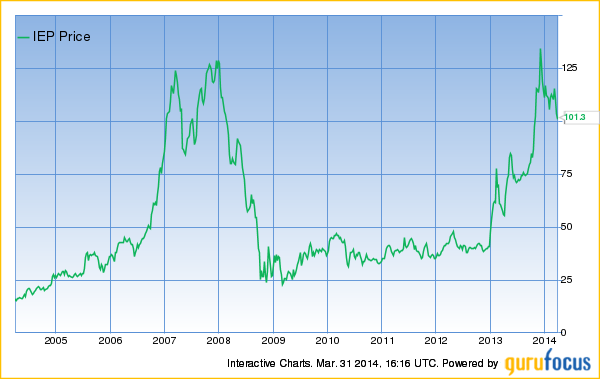Analysis of Guru Companies: Carl Icahn, Icahn Enterprises LP
Of the investing gurus we follow at GuruFocus.com, six have publicly traded companies that are directly affected by their investments. So far I discussed Warren Buffett (Trades, Portfolio) and his company, Berkshire Hathaway. The next stock I am discussing is Carl Icahn (Trades, Portfolio)'s, Icahn Enterprises LP (IEP).
The Guru
Carl Icahn (Trades, Portfolio) (chairman of the board) is the most well-known activist investor and commonly in the news. Lately he has been in the news for his investments in eBay, Herbalife, and Apple. Icahn earned a degree in philosophy from Princeton and also attended medical school for two years before joining the army. He became a stock broker in 1961 and has been an activist investor since 1980. Early on he developed a reputation as a ruthless corporate raider. In recent years he has been publicly working on improving his image to be known as an activist for improving corporate governance.
In Icahn Enterprises LP's annual report, Carl Icahn (Trades, Portfolio) gives a description of his strategy. Below is the opening paragraph:
"Across all of our businesses, our success is based on a simple formula: we seek to find undervalued companies in the Graham & Dodd tradition, a methodology for valuing stocks that primarily looks for deeply depressed prices. However, while the typical Graham & Dodd value investor purchases undervalued securities and waits for results, we often become actively involved in the companies we target. That activity may involve a broad range of approaches, from influencing the management of
a target to take steps to improve shareholder value, to acquiring a controlling interest or outright ownership of the target company in order to implement changes that we believe are required to improve its business, and then operating and expanding that business. This activism has brought about very strong returns over the years."
The Company
Icahn Enterprises is a diversified holding company structured as a master limited partnership. It has nine primary business segments: Investment, Automotive, Energy, Gaming, Railcar, Food Packaging, Metals, Real Estate and Home Fashion. Icahn Enterprises will take large positions in a company with the goal of increasing shareholder value by taking active roles in the target's board of directors. As far as a succession plan for Carl Icahn (Trades, Portfolio), the Form 10-K states, "In the event of Mr. Icahn's death, control of Mr. Icahn's interest in Icahn Enterprises and its general partner will be placed a charitable and other trusts under the control of senior Icahn Enterprises executives and family members."
Top 5 Holdings (as of 12/31/2013)
Company | Market Value ($Million) |
Apple (APPL) | $2,654 |
*Forest Labs (FRX) | $1,841 |
Chesapeake Energy (CHK) | $1,803 |
Herbalife (HLF) | $1,335 |
Transocean (RIG) | $1,061 |
*Activis announced on 2/18/14 that it will acquire Forest Laboratories
Conclusion
Icahn Enterprises has a market cap of about only $12 billion, compared to $308 billion for Berkshire Hathaway. With a much smaller market cap, Carl Icahn (Trades, Portfolio) can find investments that will have a larger impact on the company's returns. As shown in the chart below, Icahn Enterprises is a very volatile stock. It can triple in a year and fall right back down. In his recent earnings presentation, he added the market value of IEP's public subsidiaries and holding company interest in funds and book value or comparables of other assets. He used the term "indicative asset value," and the value came out to be $9.132 billion. That calculates into $80.11 per share.
His top five holdings are up about 2 percent year-to-date, so the updated "indicative asset value" could be about $81.71 today. Now that we have a Net Asset Value (NAV), how high of a premium should be paid for the stock? A way to look at it is that an expense is being charge to manage the fund, but instead of paying an annual expense, it is all being paid up front. An average actively managed fund has about a 1.5 percent expense ratio.
Carl Icahn (Trades, Portfolio) is not your typical fund manager. He will take active positions in a company's board of directors and fight for shareholder value. I might be willing to pay 3 percent per year. Compounded over ten years, that comes out to about 34 percent. If I am willing to pay half of that up front, that comes out to a premium of 17 percent. A 17 percent premium would put us at a price of $95.60. Today the stock is trading for about $102 per share; therefore, I would wait for a slight pullback to purchase the stock. If I were to buy the stock with the intent of holding it for a shorter period of time, I would then buy the stock at a lower premium to its "indicative asset value."

This article first appeared on GuruFocus.
